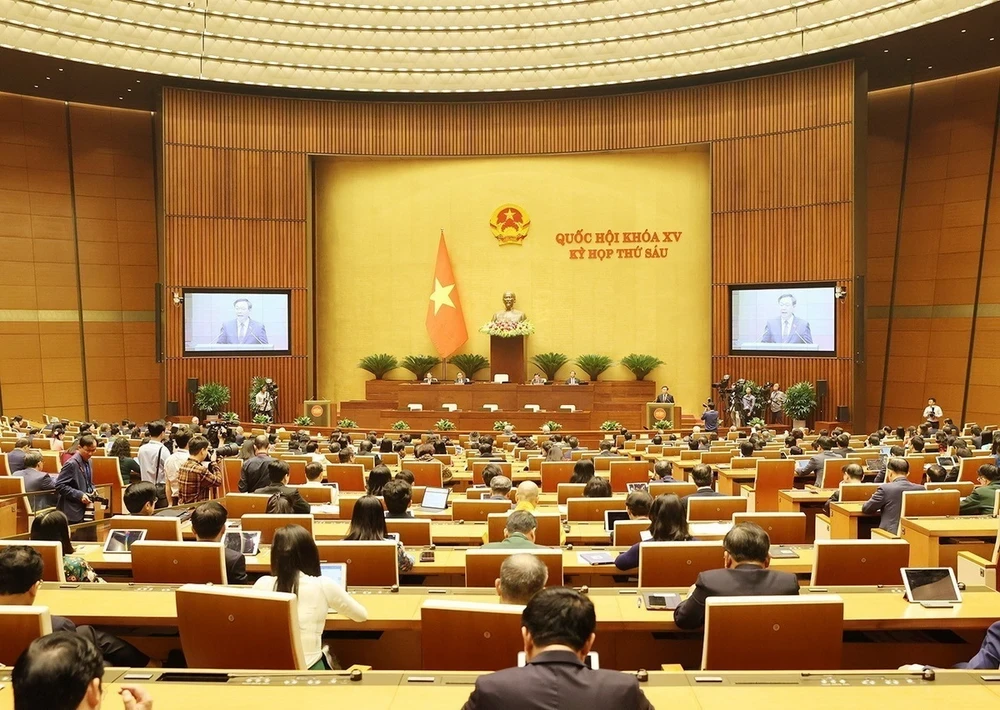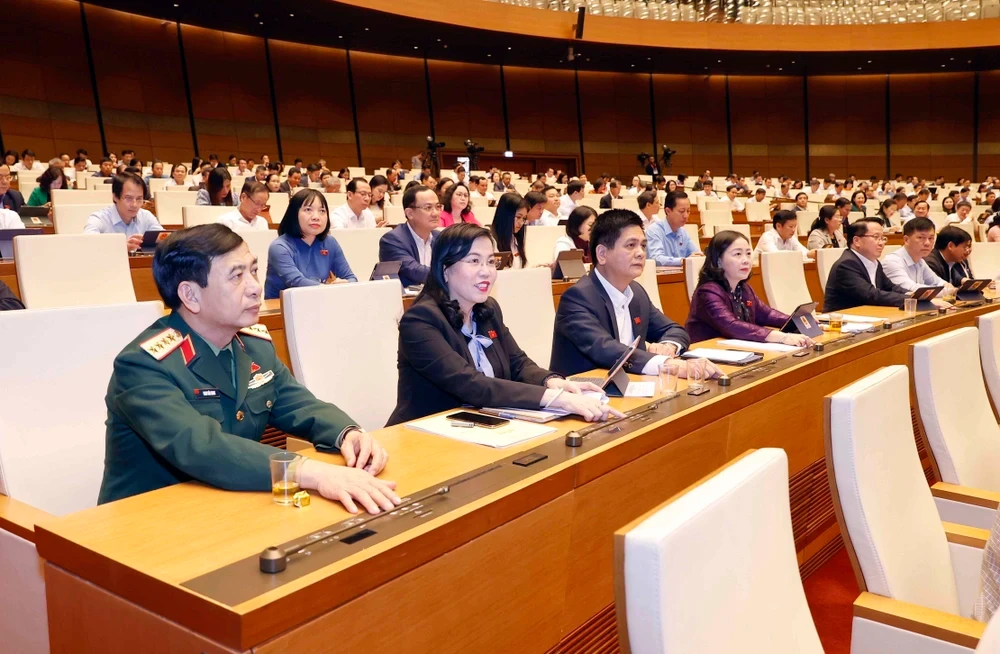The Office of the President announced the President's Order promulgating the laws passed, including the Law on Identification; the Law on Forces Participating in Protecting Security and Order at the Grassroots Level, and the Law on Housing.

On the morning of December 25, at the Presidential Palace, the Office of the President held a press conference to announce the President's Order promulgating the laws passed by the 15th National Assembly at the 6th Session, including: Law on Identity Cards; Law on Forces Participating in Protecting Security and Order at the Grassroots Level; Law on Management and Protection of National Defense Works and Military Zones; Law on Telecommunications; Law on Water Resources; Law on Housing; Law on Real Estate Business.
Deputy Head of the Office of the President Pham Thanh Ha chaired the press conference.
Issuing and managing electronic identification cards
The 2023 Law on Identification has 7 chapters and 46 articles; it will take effect from July 1, 2024.
The subjects of application of the 2023 Law on Identification are more expanded than the 2014 Law on Citizen Identification.
In addition to applying to Vietnamese citizens, relevant agencies, organizations and individuals, the Law also applies to people of Vietnamese origin whose nationality has not been determined and who are living in Vietnam.
The 2023 Law on Identification stipulates the expansion and integration of many other information of citizens and people of Vietnamese origin in the national population databases and identification databases compared to the 2014 Law on Citizen Identification to directly serve the application of the utility of identity cards, electronic identification, and connection and sharing of people's information.
The Law has been amended and supplemented in the direction of removing fingerprints and amending regulations on information on ID card numbers, the words "citizen identification card, hometown, permanent residence, signature of the card issuer" to "personal identification number, ID card, place of birth registration, place of residence on the ID card"... to facilitate people in the process of using ID cards, limit the need to issue new ID cards and ensure people's privacy.
Issuing and managing electronic identification cards is new content compared to the provisions of the 2014 Law on Citizen Identification.
The 2023 Law on Identification stipulates that each Vietnamese citizen is granted an electronic identification card, which has the same value as an identification card, and is used to carry out administrative procedures, public services, and other transactions and activities according to the needs of citizens.
Protect national security, ensure social order and safety
The Law on Forces Participating in Protecting Security and Order at the Grassroots Level in 2023 has 5 chapters and 33 articles; effective from July 1, 2024.
The law-making aims to institutionalize the Party's viewpoints and policies on consolidating, arranging, and streamlining internal focal points in conjunction with perfecting the functions, tasks, powers, and working relationships of each grassroots organization; reducing state budget expenditures; concretizing and creating a legal basis to ensure the implementation of the provisions of the 2013 Constitution on human rights and civil rights to meet the requirements of protecting national security and ensuring social order and safety in the new situation. At the same time, building and consolidating the mass movement to protect security, order, and social safety at the grassroots level under the leadership of the Party, the management of the government, and the functional forces, of which the People's Public Security is the core, is implemented...

The Law stipulates the position, functions, tasks, organizational principles, working relations, force building, ensuring operating conditions and responsibilities of agencies and organizations towards forces participating in protecting security and order at the grassroots level.
Strengthening national defense
To overcome the shortcomings and limitations of the 1994 Ordinance on Protection of National Defense Works and Military Zones and institutionalize the Party's guidelines, viewpoints and policies on protecting the Fatherland in the new situation; create a solid legal basis for the management and protection of national defense works and military zones, contribute to strengthening national defense potential, building and consolidating the all-people national defense, closely linked with the socio-economic development of the country, the development and promulgation of the Law on Management and Protection of National Defense Works and Military Zones is very necessary.
The Law on Management and Protection of National Defense Works and Military Zones consists of 6 chapters and 34 articles; effective from January 1, 2025.
The law-making aims to promote the combined strength of the entire political system and the entire people in organizing and implementing the construction of an all-people national defense and people's war posture to successfully carry out the task of firmly protecting the independence, sovereignty, unity and territorial integrity of the Fatherland in the new situation.
At the same time, strengthen measures to manage and protect national defense works and military zones; develop support policies and prioritize investment programs for socio-economic development for localities, agencies, organizations, households and individuals in areas greatly affected by socio-economic development, with limited foreign investment; policies for areas with restricted land use rights and other legitimate rights and interests due to requirements for management, protection and ensuring safety for national defense works and military zones...
Regulations on obligations of telecommunications enterprises
The 2023 Telecommunications Law consists of 10 chapters and 73 articles; effective from July 1, 2024.
Notably, regarding the auction of telecommunications numbers and Internet resources, the 2023 Telecommunications Law specifically stipulates the types of telecommunications resources allocated through auction. The selection of codes and telecommunications numbers allocated through auction will be decided by the market; after the auction is unsuccessful, direct and sequential allocation will be returned. The Law stipulates the determination of the starting price for auction for each type of code, telecommunications number, and Internet domain name.
The Law supplements the obligations of telecommunications enterprises to authenticate, store, and manage subscriber information, handle SIM cards with incomplete or inaccurate information (junk SIM cards), prevent spam messages and illegal calls; supplements the obligations of telecommunications subscribers not to use their personal information to enter into contracts with others, except in cases permitted by law, and to be responsible for the subscriber numbers registered for use.
Ensuring national water security
The 2023 Law on Water Resources consists of 10 chapters and 86 articles; effective from July 1, 2024; has specified 4 groups of policies on: ensuring water security; socialization of the water sector; water resources economics; protecting water resources, preventing and combating harmful effects caused by water and amending and supplementing a number of other policies.
Ensuring national water security is the guiding principle in the construction process until the National Assembly passes the Law on Water Resources.
Policies related to water security are reflected throughout the chapters and articles of the law.
The goal by 2030 is to raise the level of ensuring national water security to the group of countries ensuring effective water resource security in the Southeast Asian region and approaching advanced countries in the world.
Ensuring the quantity and quality of water for people's daily life in all situations, meeting the water use requirements for socio-economic development, national defense, security, environmental activities and minimizing the risks of harmful effects from human-caused and natural disasters related to water.
At the same time, there are preferential policies for investment projects to exploit water for daily life and production for people in areas with scarce fresh water, ethnic minority areas, mountainous areas, border areas, islands, areas with difficult or especially difficult socio-economic conditions; creating conditions for access to domestic water for the poor, women, children, people with disabilities and other vulnerable groups.
One of the core principles of the law is that water resources must be managed comprehensively and consistently in terms of quantity and quality, between surface water and groundwater, between upstream and downstream; clearly assigning and decentralizing the responsibility for state management of water resources and water sources with the responsibility for state management of planning, construction, and operation of irrigation works, hydroelectricity, urban water supply, and rural water supply; resolving overlaps, conflicts, and loopholes in laws to improve the effectiveness of state management of water resources, ensuring national water resources security.
Housing development for the people
The Housing Law (amended) consists of 13 chapters and 198 articles, effective from January 1, 2025.
The development of the Housing Law (amended) aims to promptly institutionalize the Party's guidelines and policies and the State's policies in developing housing for the people, especially low-income people and the poor who are unable to create housing according to the market mechanism; amend and perfect the provisions of the 2014 Housing Law in accordance with the actual situation, remove existing problems and limitations, ensure the constitutionality, consistency and synchronization between the provisions of the Housing Law (amended) and other relevant laws.
The Housing Law (amended) has basic new points related to the national housing development strategy, provincial housing development programs and plans; housing development; renovation and reconstruction of apartment buildings; social housing policies; finance for housing development; housing management and use; management and use of apartment buildings...
Tightly manage the real estate market
The Law on Real Estate Business (amended) consists of 10 chapters and 83 articles, effective from January 1, 2025.
The development of the Law on Real Estate Business (amended) aims to promptly institutionalize the Party's guidelines and policies and the State's policies in developing and strictly managing the real estate market, perfecting the mechanisms and policies for healthy, sustainable development and smooth operation of the real estate market; synchronously operating the land use rights market, labor market, and real estate market; ensuring the stable, healthy, public, and transparent development of the real estate market.
At the same time, amend and perfect the provisions of the 2014 Law on Real Estate Business to suit the actual situation, remove existing problems and limitations, ensure constitutionality, consistency and synchronization between the provisions of the Law on Real Estate Business (amended) and other relevant laws.
The Law on Real Estate Business (amended) has a number of new points related to the scope of the law; types of real estate and real estate projects put into business; public information about real estate and real estate projects put into business; conditions for organizations and individuals when doing real estate business; policies on trading in available and future housing and construction works; transfer of land use rights with technical infrastructure in real estate projects to individuals who build their own houses and transfer, lease, sublease of land use rights with technical infrastructure in real estate projects to organizations; transfer of all or part of a real estate project; real estate business contracts.
According to VNA